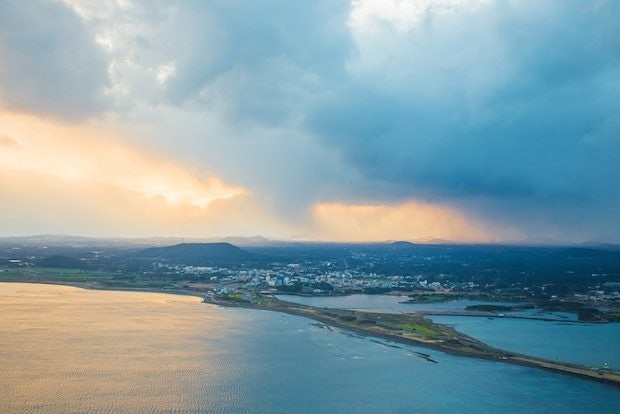
South Korea's Jeju Island. (Shutterstock)
Although a tidal wave of Chinese tourists has been good for business in South Korea’s Jeju Island, tension is increasing as locals and other foreign tourists feel pushed out, and spending per person plummets as Jeju goes from aspirational destination for wealthy Chinese to “mass-market.”
Despite China’s attempts to encourage its tourists to behave themselves abroad, pressure continues to rise as group tourists—most of them on their first trip abroad—become the subject of scorn for other travelers in Jeju. Chagrin about mainland travelers went viral this spring, with a video by a Thai model showing pushy tourists crowding the tax refund aisle at Jeju airport racking up over a million views.
In response to Jeju’s changing fortunes, business and tourism officials held a meeting last week in Seoul to tackle the subject of how to ensure what is happening in Jeju doesn’t get worse, or envelop the entire Korean tourism industry.
As Stephen Revere of Seoul-based English-language lifestyle publication 10 Magazine said at the event, he believes South Korea should work quickly to ensure Jeju retains its character and local culture, rather than succumbing to the homogenizing forces of tourism overdevelopment. As Revere noted at the event, “I think Korea needs to start saying, ‘We like Jeju-do to be Jeju-do,”referring to the Korean name of Jeju Island. Added Revere, “I hate to say it, but the ownership of Jeju-do is gradually transferring to many, many Chinese hands.”
Kim Tae-il, a professor at Jeju National University, told The Wall Street Journal earlier this year, the influx of Chinese investment in Jeju—welcomed by some local businesspeople—is similar to the flood of Japanese hot money in the United States in the 1970s and 80s. Said Kim, “The Chinese have come to town and have started buying without worrying about price—just like the Japanese did in Hawaii.”
Chinese travelers now make up the vast majority of foreign visitors to Jeju. To date, around 850,000 Chinese tourists have traveled to Jeju, accounting for 85 percent of the island’s 1.35 million arrivals. While tourists are attracted by the low prices of packaged tours and visa-free travel, Chinese investors and wealthy individuals have been attracted to the island in large numbers, enticed by South Korea’s offer of permanent residency for significant foreign investment in the island.
Many—if not most—Chinese tourists, whether affluent or mass-market, visit Korea with the intention of shopping as well as sightseeing. However, a growing number of these travelers are visiting on packaged bargain deals, meaning department stores in Jeju as well as Seoul are seeing the once massive spending by Chinese drop like a stone. The changing spending landscape can be exemplified by what’s happening in Seoul, where Lotte Department Store saw a 36 percent decrease in Chinese tourist spending this year compared to 2013, as sophisticated and bargain-driven buyers outpaced high-value affluent Chinese shoppers.
The rising tide of Chinese tourists and real-estate investors in Jeju, in particular, is very much a double-edged sword, as the short-term rise in arrivals might backfire over time, essentially draining areas of the island of their traditional charm. As Didier Beltoise, President and CEO at Cs, said at last week’s tourism event in Korea, if Chinese investors simply turn Jeju into a carbon copy of tourist destinations in China with the same style of hotels, amenities, and activities popular in China, Jeju could lose its allure and see Chinese arrivals plummet within a decade as Chinese arrivals simply get bored.
Clearly, Jeju is at a major inflection point. After aggressively targeting the China market in recent years—offering visa-free travel and easing investment rules—some on the island are worried that the growth has come too quickly. The dilemma faced by Jeju can be summed up by one local shop owner, Kim Ho-san, who told WSJ, “Chinese visitors are big shoppers. I want to see them keep coming in.” Yet Kim added that she doesn’t want to put all of her eggs in one basket, increasing the risk of losing income if Chinese tourism to Korea were to decrease for some unforeseen reason.
Ultimately, Jeju may find that it can’t have its cake and eat it too. Rolling out the welcome mat for Chinese tourists doesn’t just mean welcoming the sophisticated, educated ultra-wealthy—it means expecting the value-driven, less worldly mass tourist as well. The question then becomes: what can Jeju do about it?